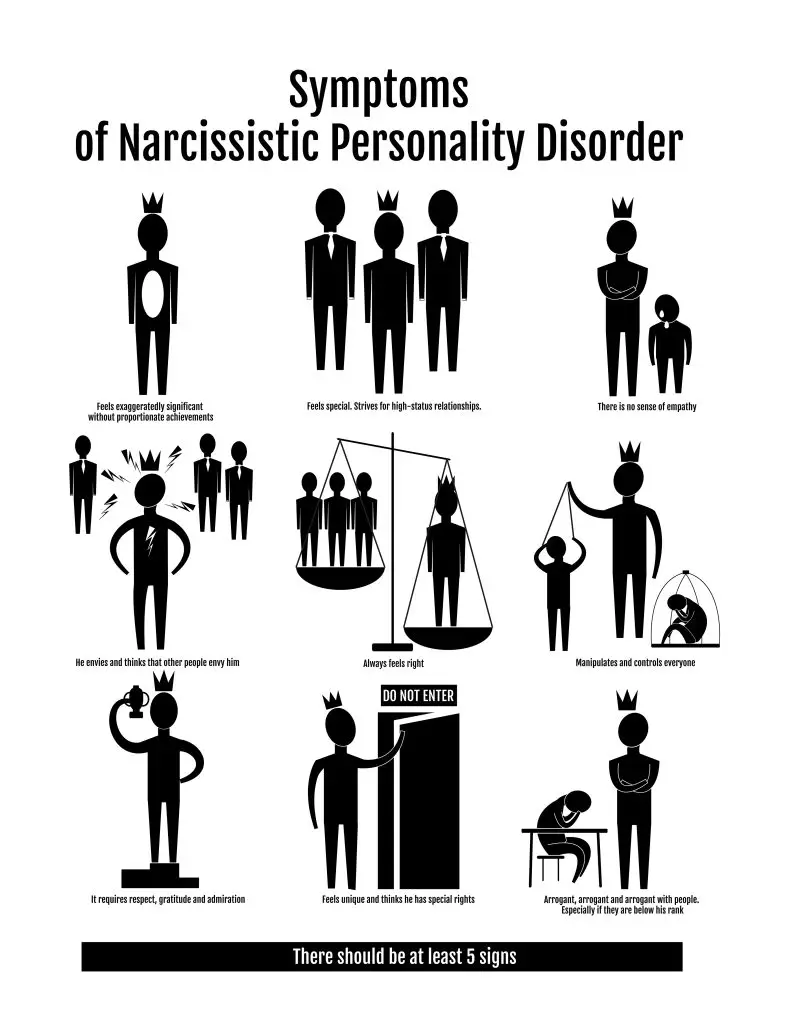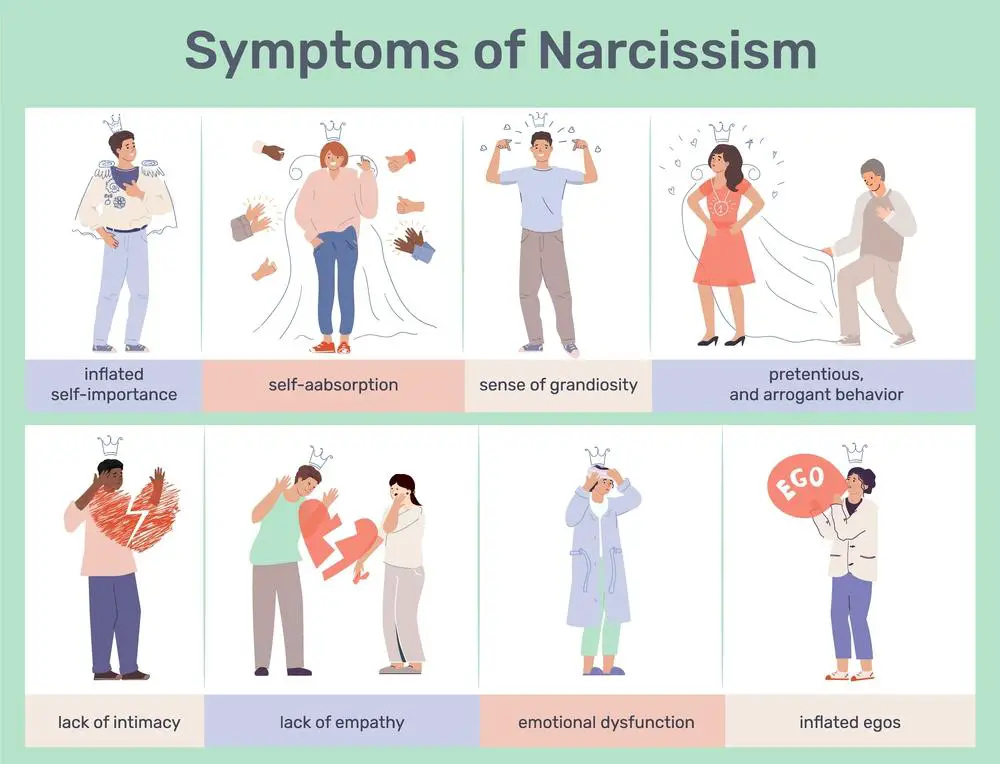As a BetterHelp affiliate, we receive compensation from BetterHelp if you purchase products or services through the links provided
Navigating workplace dynamics can be challenging, particularly when dealing with a coworker who exhibits narcissistic behaviors. Such individuals often demonstrate a pattern of grandiosity, need for admiration, and lack of empathy, which are traits associated with Narcissistic Personality Disorder. In the office setting, these behaviors can create a tense atmosphere, impact team cohesion, and complicate communication.
Understanding how to handle a female narcissist at work requires a balance between maintaining professional integrity and protecting your well-being. It’s about recognizing the signs of narcissism, setting boundaries, and managing interactions. Should you find yourself reporting to a narcissistic leader, strategies like documenting interactions and seeking support from human resources become even more vital.
Building a supportive work environment is another essential aspect. This involves nurturing healthy relationships with other colleagues and advocating for a respectful workplace culture, and sometimes, it requires personal growth and developing strategies for self-protection. By dealing with a female narcissist at work effectively, you can mitigate stress and maintain your performance.
Key Takeaways
- Recognize narcissistic behaviors and respond with professional boundaries.
- Document interactions and seek HR support if faced with narcissistic leadership.
- Foster healthy relationships and personal resilience to thrive in a challenging work environment.
 Understanding Narcissism in the Workplace
Understanding Narcissism in the Workplace
Navigating the workplace requires understanding various personalities, including those with narcissistic characteristics. Your ability to deal with narcissistic individuals can significantly impact your work environment.
Defining Narcissistic Personality Disorder
Narcissistic Personality Disorder (NPD) is a mental disorder characterized by an inflated sense of self-importance, a deep need for excessive attention and admiration, troubled relationships, and a lack of empathy for others. However, behind this mask of extreme confidence lies a fragile self-esteem vulnerable to the slightest criticism.
Key Takeaway: NPD is a complex and often misunderstood diagnosis that affects interpersonal relationships, including those at work.
Recognizing Narcissistic Behaviors and Tendencies
You’ll typically know if you’re dealing with someone who has narcissistic tendencies by their behavior. Signs include a constant need for praise, manipulative actions, and an inability to consider others’ feelings. They may lie to get ahead, gaslight to control a narrative, and exhibit abusive behavior when challenged. These patterns can lead to a toxic work environment.
- Look out for:
- Frequent stories of grandiosity
- Sensitivity to criticism
- Lack of empathy
Key Takeaway: Awareness of these behaviors can better equip you to handle interactions with narcissists in the workplace.
Types of Narcissism at Work
At work, you might encounter primarily two types of narcissism: overt and covert. Grandiose narcissists are more pronounced, displaying arrogance and demanding attention. In contrast, covert narcissists might appear shy or self-effacing but are just as focused on themselves and can be equally manipulative.
- Grandiose Narcissists: Bold, assertive, overtly self-confident
- Covert Narcissists: Subtle, often playing the victim, quietly self-centered
Key Takeaway: Identifying the type of narcissism can inform your approach to building a more harmonious work relationship.
 Interacting with a Narcissistic Coworker
Interacting with a Narcissistic Coworker
Working with a narcissistic coworker can be challenging. Maintaining boundaries, managing your emotional health, and managing manipulation effectively is crucial.
Maintaining Professional Boundaries
Setting clear boundaries is essential for a healthy relationship with a coworker who exhibits narcissistic behavior. Here’s how:
- Define Your Limits: Determine what you are willing to tolerate and where you draw the line.
- Communicate Boundaries Calmly: If your coworker oversteps, respectfully remind them of your limits.
Key Takeaway: Firm boundaries help preserve your self-esteem and professional integrity.
Strategies to Manage Emotional Impact
Narcissistic behavior can take a toll on your emotions. Protect your mental health with these strategies:
- Positive Self-Talk: Boost your confidence by reinforcing your values and contributions.
- Coping Strategies: Engage in stress-relief activities outside work to maintain a balanced perspective.
Key Takeaway: Prioritizing self-care sustains your emotional well-being and helps you stay composed.
Handling Manipulation and Gaslighting
Recognize and counteract manipulative tactics without falling into the trap of self-doubt:
- Identify Lies: Be alert to inconsistencies in your coworker’s stories.
- Trust Your Experience: If you sense gaslighting, trust your memory and perceptions.
Key Takeaway: Trusting your instincts allows you to stand your ground and not fall for manipulation.
 Dealing with Narcissistic Leadership
Dealing with Narcissistic Leadership
Navigating the challenges of a narcissistic boss requires strategic thinking and resilience. Here are ways to manage that professional relationship, protect your reputation, and respond to criticism.
Managing Relationship with a Narcissistic Boss
Your primary goal is to maintain a professional dynamic while safeguarding your interests. When interacting with a narcissistic boss:
- Understand Their Needs: Recognize their desire for attention and admiration. Aim to acknowledge their efforts where appropriate without being disingenuous.
- Set Boundaries: Be clear about what behaviors you will not tolerate. Have these personal limits established mentally?
- Document Interactions: Keep records of conversations and directives. Send follow-up emails summarizing meaningful discussions to create a paper trail.
Key Takeaway: Balancing acknowledgment of their achievements with clear personal boundaries helps manage the relationship.
 Protecting Your Professional Reputation
Protecting Your Professional Reputation
Your professional standing is your currency in the workplace. To protect it:
- Don’t Take the Bait: Stay neutral and depersonalize negative comments. A narcissistic boss may try to rattle you to gain control or attention. Keep your responses focused on work.
- Credit Where Credit Is Due: If your boss takes credit for your work, calmly present documentation substantiating your involvement and contributions.
- Stay Visible: Make your work and contributions known to others in the organization professionally, such as in meetings or through shared reports.
Key Takeaway: Documenting your efforts and staying cool-headed can shield your reputation from being undermined.
Responding to Personal Attacks and Criticism
Handling criticism from a boss who may be manipulative needs tact. Here’s how:
- Focus on the Issue, Not the Person: Frame your response to criticism in a way that addresses the work-related issue at hand and not the personal attack.
- Seek Clarification: If criticized, ask for specific examples to understand the concern and challenge unfounded complaints subtly.
- Have a Witness: If possible, address problematic comments when a third party is present or follow up with an email cc’d to a relevant colleague.
Key Takeaway: Addressing the content of criticism and involving witnesses when necessary can deflect personal attacks and keep exchanges professional.
Building a Supportive Work Environment
Creating a supportive work environment involves fostering trust and open communication among coworkers. It’s about establishing a culture where teamwork triumphs over individual competition, especially when dealing with difficult personalities.
Encouraging Team Collaboration and Support
Team Collaboration:
- Hold regular team-building activities to encourage rapport.
- Celebrate group achievements to highlight the importance of collaborative effort.
Peer Support:
- Set up a buddy system for new employees to integrate them into the team.
- Encourage team members to acknowledge each other’s contributions.
Key takeaway: Promote a culture where coworkers rely on and uplift each other.
 Effective Communication Strategies
Effective Communication Strategies
- Apply ‘I’ statements to reduce defensiveness during confrontations.
- Seek to understand before being understood to foster a healthy dialog.
Meeting Dynamics:
- Establish ground rules for respectful communication in meetings.
- Encourage active listening by summarizing others’ points before speaking.
Key takeaway: Clear and respectful communication is paramount in maintaining a healthy professional relationship and resolving conflicts amicably.
Personal Growth and Self-Protection
In dealing with a narcissistic colleague, focusing on your personal growth and protecting your well-being is crucial. Let’s explore how you can bolster your self-esteem and confidence through self-awareness, while also learning from these challenging encounters.
Developing Self-Awareness and Confidence
Building self-awareness means understanding your values, boundaries, and reactions. Here’s what you can do:
- Reflect on your interactions: Keep a journal to reflect on your daily experiences. This can help you recognize patterns and triggers in your interactions with the narcissist.
- Boost your confidence: Engage in activities that strengthen your sense of accomplishment, like taking on new projects or mastering new skills at work.
Key takeaway: Constant reflection and seeking out confidence-building experiences empower you to navigate the complex dynamics of the workplace better.
Establishing a Strong Sense of Personal Identity
Anchoring yourself in a solid personal identity helps you resist the negative influence of a narcissistic co-worker.
- Set personal goals: Define what success looks like for you, separate from the narcissist’s opinions or actions.
- Practice assertiveness: Politely but firmly communicate your needs and opinions without seeking the narcissist’s approval or validation.
Key takeaway: Grounding in a solid personal identity acts as a shield against the attempts of a narcissist to undermine or self-aggrandize at your expense.
Learning from Experiences with Narcissists
Every experience, even negative ones, can be a valuable learning opportunity. Here’s how:
- Identify lessons: After encounters with the narcissist, ask yourself, “What can I learn about my own limits or capabilities?”
- Develop coping strategies: Recognize what helps you stay calm and focused, whether it’s deep breathing, taking short breaks, or seeking support from trusted peers.
Key takeaway: Every interaction is a chance to learn and grow, enhancing your ability to cope with challenging situations and personalities in the workplace.
Frequently Asked Questions
Navigating workplace dynamics can be tricky, especially when working with a narcissistic colleague. Here’s how to spot the red flags and handle the situation with poise.
What are the telltale signs of a narcissistic coworker?
A narcissistic coworker often needs excessive admiration, can display feelings of entitlement, and may take advantage of others to achieve their aims. They might also demonstrate a lack of empathy and be envious or believe others are envious of them. If you’re noticing these behaviors consistently, you might be dealing with a narcissist.
Key takeaway: If these traits are persistent, it’s important to strategize your interactions with this individual.
What strategies are effective for managing a narcissist in a professional environment?
To manage a narcissist at work, maintain professional boundaries, and avoid getting too personal. It’s helpful to:
- Give clear feedback.
- Set firm boundaries.
- Keep records of your interactions.
Remember, it’s crucial not to take their actions personally, as they are a reflection of the narcissist’s personality, not your worth.
Key takeaway: Focus on professionalism and boundary-setting to manage a narcissistic coworker effectively.
How can one identify narcissistic behaviors during a performance review?
During a performance review, a narcissist may be unwilling to accept constructive criticism or blame others for their mistakes. They might also exaggerate their achievements and struggle to recognize the success of their peers. When giving feedback, it’s best to stick to facts and remain objective.
Key takeaway: Be factual and objective when reviewing a narcissist’s performance to maintain a constructive conversation.
What are the best approaches for disarming a narcissist in the workplace?
To disarm a narcissist, you can use tactics like:
- Praising their contributions when appropriate.
- Redirecting conversations to focus on team goals.
- Not reacting emotionally to provocation.
This can help keep your interactions civil and take the wind out of any attempts at manipulation.
Key takeaway: Positive recognition and a focus on teamwork can help neutralize challenging behaviors.
In what ways can you protect yourself from the negative impacts of a toxic narcissist at work?
Protecting yourself from a toxic narcissist involves building a supportive network within your workplace. Communicate openly with your peers and seek guidance from human resources if necessary. Prioritize your mental health by setting emotional boundaries and knowing when to disengage from negative interactions.
Key takeaway: A strong support system and personal boundaries are your safeguards against workplace toxicity.
How should one interact with a narcissistic boss to maintain a peaceful work atmosphere?
When dealing with a narcissistic boss:
- Show that you understand their viewpoints.
- Focus on how your work benefits the company’s goals.
- Pick your battles wisely.
You can maintain a more tranquil work environment by aligning your work with their interests and choosing when to address issues.
Key takeaway: Keeping communications aligned with your narcissistic boss’s interests can help maintain a cordial work atmosphere.
- Breaking the Silence: Why Men’s Mental Health Matters More Than Ever - April 15, 2025
- How to Transform a Home’s Patio Space into a Relaxing Space - March 23, 2025
- 5 Strategies to Use a Cell Phone to Help Manage Your Stress - March 23, 2025
This site contains affiliate links to products. We will receive a commission for purchases made through these links.


 Understanding Narcissism in the Workplace
Understanding Narcissism in the Workplace Interacting with a Narcissistic Coworker
Interacting with a Narcissistic Coworker Dealing with Narcissistic Leadership
Dealing with Narcissistic Leadership Protecting Your Professional Reputation
Protecting Your Professional Reputation Effective Communication Strategies
Effective Communication Strategies
